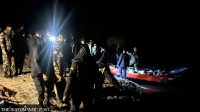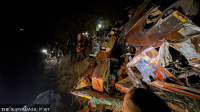National
Amnesty International calls for impartial investigation into recent killing of Dalits
The deaths of five Dalit youths in Rukum and that of a Dalit teenager in Rupandehi must be probed independently as local authorities are implicated in both cases, said the rights group..png&w=900&height=601)
Post Report
The Nepal chapter of Amnesty International has called on the Nepali authorities to immediately and effectively investigate the deaths of five Dalits youths in Rukum (West) and ensure justice to the victims.
Issuing a statement on Thursday, the international rights group also sought a probe into the death of a 12-year-old girl who had been forcibly married to her rapist in Rupandehi.
The body of the 12-year-old Dalit girl was discovered hanging from a tree on May 23 at Devdaha village in Rupandehi district, a day after she was forcibly married to a man from a so-called ‘upper caste’ who had raped her. A preliminary police investigation had found that she had been raped and murdered.
The same day, in Rukum (West), a group of 18 young men, many of them belonging to the Dalit community, was attacked by a village mob from a dominant caste, who chased them to the edge of the Bheri river. The bodies of five men were discovered over the next five days. One other man remains missing.
The rights group has demanded that the incidents be probed independently as the local authorities are implicated in both cases.
“Given the involvement of local government representatives in both tragedies, and the fears of the victims that justice will not be delivered, it is imperative that there is an independent and effective investigation,” the statement quoted Nirajan Thapaliya, director of Amnesty International Nepal, as saying. “The suspected perpetrators must be held accountable through a process that is credible in the eyes of the victims and their families.”
The rights group said that the horrific deaths exemplify the discrimination and violence that Dalits continue to face in Nepal, where laws and policies are inadequately enforced as affected communities lack protection.
“The shocking violence highlights the enduring structural problems that reinforce the caste-based discrimination, ostracization, and violence that Dalits in Nepal are subjected to,” said Thapaliya. “The limited progress that has been made in laws and policies to protect Dalits is clearly not enough and must be urgently accelerated.”




 22.25°C Kathmandu
22.25°C Kathmandu













